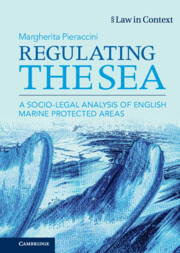Book contents
- Regulating the Sea
- Law in Context
- Regulating the Sea
- Copyright page
- Contents
- Preface and Acknowledgements
- Table of Cases
- Table of Legislation
- Abbreviations
- Introduction
- 1 The Geography of Regulation
- 2 Multi-level Regulation of English Marine Protected Areas
- 3 Impact Assessments for Marine Protected Areas
- 4 Risk-Based Regulation
- 5 Marine Conservation Zones Designation
- 6 Environmental Democracy in Marine Protected Areas Management
- 7 Climate Change and Marine Protected Areas Network
- 8 Marine Protected Areas Regulation in the Context of Regulatory Uncertainty and Change
- Concluding Remarks
- Bibliography
- Index
1 - The Geography of Regulation
Marine Protected Areas, Commons and Commoning
Published online by Cambridge University Press: 15 December 2022
- Regulating the Sea
- Law in Context
- Regulating the Sea
- Copyright page
- Contents
- Preface and Acknowledgements
- Table of Cases
- Table of Legislation
- Abbreviations
- Introduction
- 1 The Geography of Regulation
- 2 Multi-level Regulation of English Marine Protected Areas
- 3 Impact Assessments for Marine Protected Areas
- 4 Risk-Based Regulation
- 5 Marine Conservation Zones Designation
- 6 Environmental Democracy in Marine Protected Areas Management
- 7 Climate Change and Marine Protected Areas Network
- 8 Marine Protected Areas Regulation in the Context of Regulatory Uncertainty and Change
- Concluding Remarks
- Bibliography
- Index
Summary
This chapter introduces the multiple roles of marine protected areas using the language of the commons. After introducing how international biodiversity law uses commons' language, it attempts to discuss two main characterisations of marine protected areas: marine protected areas as regulatory tools for common-pool resources and marine protected area as institutional sites for supporting or hindering commoning practices. The discussion draws on three principal strands of social science literature: political ecology to show how rational and scientific interventions are always political, geographical literature to discuss the meaning of territory and uncover the more-than-human elements in the analysis of conservation intervention and most crucially, the literature on commons, which spans from the more traditional Ostromian analysis of common-pool resources to the more recent and politicised literature on commoning. Investigating the relationships between marine protected areas and commons is an essential preliminary step to enable a critical discussion of how English law and regulation conceptualises marine protected areas and contributes to the formation of marine protected areas as spaces of opening and/or closing.
- Type
- Chapter
- Information
- Regulating the SeaA Socio-Legal Analysis of English Marine Protected Areas, pp. 11 - 29Publisher: Cambridge University PressPrint publication year: 2022

